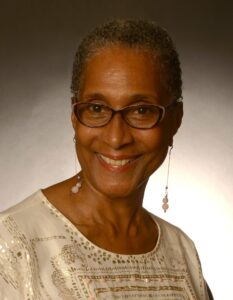Welcome to our #OlderNotOver interview series highlighting the remarkable older people transforming lives through HelpAge USA’s Friendship Bench DC program! Inspired by the Friendship Bench model in Zimbabwe, this HelpAge USA initiative empowers older people to bridge gaps in mental health care.
By sharing their wisdom and offering compassionate listening and problem-solving support, our group of dedicated “Grandparents” foster mental wellness and strengthen connections among community members across generations.

In this installment, we had the honor of speaking with Dr. Tuere Marshall, a dedicated Grandparent with Friendship Bench DC. With a life story as vibrant as a jazz solo and a heart deeply rooted in community activism, Tuere exemplifies the power of older people as catalysts for positive change.
A Washingtonian’s Journey: Family, Jazz, and Self-Discovery
Born and raised in Washington, DC, Tuere’s upbringing was a harmonious blend of cultural richness and disciplined guidance. Her father, a jazz aficionado, filled their home with the rhythms of life, while her college-educated mother instilled structure and a love for learning.
“I grew up in a very safe family life surrounded by my parents’ friends, many of whom were interracial or from international families. My dad was a jazz man and often befriended musicians who were in town to perform. On weekends, our home became a jazz set—I’d wake up on Sunday morning to find a drum kit in the living room, a musician sleeping in the basement, or an impromptu jam session around our piano,” Tuere recalls. “My upbringing was fun and funky. Mom made sure education was non-negotiable, and Dad brought a lot of street wisdom. That combination—a streetwise dad and a formally educated mom—shaped who I am today.”
Her early life was steeped in the city’s cultural and historical tapestry, a time when DC was affectionately known as “Chocolate City.” This environment nurtured her sense of identity and pride. Even as societal challenges arose, Tuere recalls feeling safe and empowered, crediting her strong family ties and community connections for grounding her self-esteem.
Turning Points: Loss, Growth, and Cultural Awakening
Tuere’s life took a profound turn in her late 20s when she lost her father, who she describes as the “glue” of her family. “When my dad passed, it reshaped everything,” she shares, her voice tinged with emotion. This loss not only marked a shift in family dynamics—including the loss of her younger sister and her taking on the responsibility of getting her younger brother through high school—but also served as a catalyst for her personal growth.
A transformative journey to Senegal in the 1970s, inspired by the cultural awakening sparked by Roots, deepened her connection to her African heritage. “I was given an African name,” she recalls, “and it was a moment that redefined my identity and responsibility to my community.”
“The changes in my family dynamic, in addition to my finding out and really aligning myself with my African roots, created a shift in who I was—a happy-go-lucky child to somebody who understood a broader perspective of life,” Tuere says reflecting on this period. “I remember feeling very responsible for improving my environment—the seed was planted for that. … I got serious about improving my life and went back to college.”
Her academic journey blossomed, thanks in part to the mentorship of Dr. Andress Taylor, who encouraged her to pursue her doctorate. “He taught me to dream beyond my own vision,” she says, crediting his guidance with expanding her aspirations.
Joining Friendship Bench DC: A New Chapter
After retiring as an English professor, Tuere found herself drawn to Friendship Bench DC. What began as casual Zoom gatherings during the pandemic evolved into a purpose-driven mission to address mental health within her community.
“I was impressed by the Zimbabwean model that Friendship Bench is based on,” Tuere explains. “It offers a culturally sensitive way to address mental wellness, filling a gap for communities like mine that often mistrust traditional healthcare.”
For Tuere, the program’s emphasis on active listening resonated deeply. “The training taught me how to listen better,” she shares. “I’ve always been a listener, but this has sharpened my skills and allowed me to support others in profound ways.”
Making an Impact
Tuere’s journey with Friendship Bench DC has not only enriched her life but has also had a ripple effect across her community. Her dedication and compassion exemplify how older people contribute wisdom, resilience, and strength.
“It’s about creating safe spaces for people to be heard,” she says. “We’re not just addressing mental health; we’re building trust and strengthening our community, one conversation at a time.”
Dr. Tuere Marshall’s story is a testament to the enduring contributions of older people and the transformative power of shared experiences.
Stay tuned for more inspiring profiles in our #OlderNotOver interview series, where we celebrate the voices of our Friendship Bench DC Grandparents who are making a difference every day.
Get Involved!
Learn more about Friendship Bench DC and how you can support our mission to empower communities through empathy and intergenerational connection
